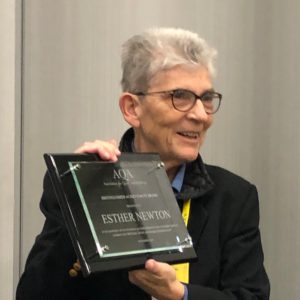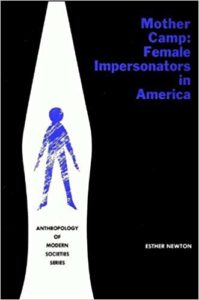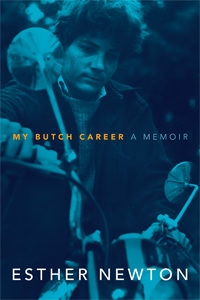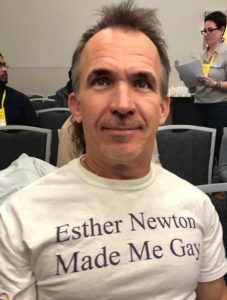
Esther Newton
by Sarah Chant
Dr. Esther Newton is a pioneer in the field of both queer anthropology and American anthropology, paving the way for the sub-discipline of queer anthropology with her early and pivotal work among queer communities in the United States. Dr. Newton graduated from University of Michigan in 1962 with a BA in History, before going on to complete her doctoral studies in anthropology at the University of Chicago. Under the advisement of David Schneider, she completed her dissertation, “The drag queens: a study in urban anthropology” in 1968, which became the material for her first book, Mother Camp: Female Impersonators in America (University of Chicago Press, 1979). This research not only explored gender performativity and sexual identity decades before others did, inspiring the likes of Judith Butler, but also well ahead of whenGender and Sexuality Studies would become a viable subdiscipline.
A founding faculty member of SUNY Purchase College in 1971, Newton continued to break ground with her next book, the ethnography Cherry Grove, Fire Island: Sixty Years in America’s First Gay and Lesbian Town (Beacon Press, 1993; reissued by Duke University Press, 2014) and the collection of essays that followed, Margaret Mead Made Me Gay: Personal Essays, Public Ideas (Duke University Press, 2000), both of which won the Ruth Benedict Award of the Society of Lesbian and Gay Anthropologists (now the AQA). Her writing extends beyond the ethnographic to include essays about the “erotic equation of fieldwork,” musings on the state of anthropology and academia, and personal memoir.
During her 35 years as a faculty member at Purchase, Newton helped to found the Lesbian and Gay Studies and Women’s Studies programs and was named Doris and Carl Kempner Distinguished Professor from 1998–2000. She was also—according to her new memoir, My Butch Career (Duke University Press, 2018)—the only out gay or lesbian professor from 1974 through the early 1990s. Dr. Newton is currently Professor Emerita of Anthropology at Purchase College, State University of New York. She is also a retired Lecturer in Women’s Studies and American Culture at the University of Michigan in Ann Arbor, Michigan.
Sarah Chant had the chance to sit down with Esther Newton at the American Anthropological Association Annual meeting in 2018 for a brief conversation about her inspirations, her writing process, her new memoir, and the importance of queer anthropology.
SC: What got you first interested in what is now called ‘queer’ anthropology? How did you decide on doing—
EN:—being queer?
SC: Not sure I would say decidefor that. How did you choose to do your dissertation on drag queens?
 EN: Well, I was in graduate school, I had passed my exams and done my Master’s thesis, and I had to decide on a topic. I was struggling with my sexual orientation because of course I had been told it was a phase. So I had thought about going to Africa, I had thought about going to Fiji, but that really scared me in terms of “okay, I’m a woman alone in the field, how am I going to manage this,” you know, because the guys that were my peers were going with their wives, and their wives were typing up their fieldnotes and whatever. But also I was afraid of mosquitos. So I was just sort of re-coming out into the gay world in Chicago, I had a lover who was a peer of mine in graduate school, and we were hanging out with another peer of mine in anthropology, and we came out to each other—that was the key moment, really, he asked me on a date and, after we’d had a few drinks, he came out to me, and then I came out to him, and from then on his new boyfriend and my girlfriend and I would go to these gay bars in Chicago—that’s where I saw drag. And I thought it was—I had seen drag before, but I thought, “I’m going to write a paper about this.” And I went to my mentor, David Schneider, and he said, “This should be your thesis.”
EN: Well, I was in graduate school, I had passed my exams and done my Master’s thesis, and I had to decide on a topic. I was struggling with my sexual orientation because of course I had been told it was a phase. So I had thought about going to Africa, I had thought about going to Fiji, but that really scared me in terms of “okay, I’m a woman alone in the field, how am I going to manage this,” you know, because the guys that were my peers were going with their wives, and their wives were typing up their fieldnotes and whatever. But also I was afraid of mosquitos. So I was just sort of re-coming out into the gay world in Chicago, I had a lover who was a peer of mine in graduate school, and we were hanging out with another peer of mine in anthropology, and we came out to each other—that was the key moment, really, he asked me on a date and, after we’d had a few drinks, he came out to me, and then I came out to him, and from then on his new boyfriend and my girlfriend and I would go to these gay bars in Chicago—that’s where I saw drag. And I thought it was—I had seen drag before, but I thought, “I’m going to write a paper about this.” And I went to my mentor, David Schneider, and he said, “This should be your thesis.”
SC: So he was supportive of it from the beginning?
EN: Oh absolutely, he backed me the whole way. In every possible way. I was very, very fortunate. It was because of him that I went to Chicago, because my parents had quite a few hooks into anthropology, and people said “oh, go to Chicago, David Schneider’s there, he likes weirdos.” Which was true. I had two other people on my committee, Julian Rivers and Clifford Geertz. Julian was supportive, definitely. Clifford…he didn’t try to stop me, let’s put it that way. I think he saw the intellectual merit of it, but anyway they didn’t try to stop me. And with such bigshots on my committee, yes, there were people who said “This isn’t anthropology” but my committee took care of them. Backed them off, you know. Later on, at my first job at Queens College, there was a guy named Mervyn Meggitt who was a big New Guinea expert, and he had been one of my biggest opponents, apparently, I found out after [she was denied tenure]. So he was my superior at Queens College, that was kind of uncomfortable. But I did get fired.
SC: Who do you see as your foremothers or forefathers—or forepeople—in anthropology?
EN: Ruth Benedict, for sure. A lot of the Chicago sociologists—Erving Goffman is huge hero of mine. Stigma:Notes on the Management of Spoiled Identity(Simon and Schuster, 1963) is the best single book that’s ever been written about what we go through. David Schneider introduced me to all their work, he was a friend of Goffman’s so he knew him. And as for the women, it was mostly Margaret Mead and Benedict. The men: David Schneider—I mean the idea that you could even do American fieldwork was because of him and his kinship project. Cliff Geertz influenced me, intellectually, but as far as gay work, the most influential was Goffman even though his topic was broader, which was a good thing, because it really worked. You know, I was kind of out there on the fringe. Of course I didn’t know at that time how much it would hurt me, professionally, but I’m stubborn.
SC: What excites you about current queer anthropology and its future as a subdiscipline?
EN: I’ll be 78 this month and so…but I can see that it’s exploded, and I think that’s a very good thing. The transnational perspective is vital, and it’s going to rearrange our thinking about gender and sexuality. And it’s always wonderful when young people come into the field because [then] you know you’re not dying on the vine. It’s wonderful.
This whole middle generation [of queer anthropologists]—Martin Manalansan, David Valentine, Tom Boellstorff—those people came to us, because they had to have some support or they wouldn’t have gotten through. Usually it was a feminist faculty member who would support them, but didn’t know anything about what they were trying to do, and so the meetings [SOLGA and, later AQA, meetings at the AAAs] were very, very important because then they could meet us, we would read their work, you know, we gave them a lot of encouragement. It’s very important for [young anthropology students] to come and network with older queers, some of whom have power now.
SC: Your new book, My Butch Career,is a memoir, and I’m wondering what you found to be the difference between writing memoir and writing ethnography. Was it a different process?
 EN: It was very different. There was no fieldwork involved, so that’s a huge difference. All of my work, with a few exceptions, I have wanted to write accessibly, so that literate people—even if they weren’t anthropologists—could understand what I was doing. There are some sections [of my previous work] that I think are a little hard going for non-anthropologists, and that were really addressed to anthropologists, and in my essays there are some that really had to do with what was going on in academia, and anthropology specifically. But in writing this book, I was interested in a broad audience of queers. Now whether it will cross over and get any straight people other than my friends to read it, that’s a different question. But I just saw yesterday an excerpt that Duke had pulled together that’s on LitHub. I did a whole thing about the movie Dirty Dancing and I argued that it’s really a queer romance in terms of today’s idea of what queer is. So they pulled that together and it really works well. I know Duke is interested in attracting straight people. So we’ll see. So far everything I’ve ever gotten [in terms of feedback] has come from queers.
EN: It was very different. There was no fieldwork involved, so that’s a huge difference. All of my work, with a few exceptions, I have wanted to write accessibly, so that literate people—even if they weren’t anthropologists—could understand what I was doing. There are some sections [of my previous work] that I think are a little hard going for non-anthropologists, and that were really addressed to anthropologists, and in my essays there are some that really had to do with what was going on in academia, and anthropology specifically. But in writing this book, I was interested in a broad audience of queers. Now whether it will cross over and get any straight people other than my friends to read it, that’s a different question. But I just saw yesterday an excerpt that Duke had pulled together that’s on LitHub. I did a whole thing about the movie Dirty Dancing and I argued that it’s really a queer romance in terms of today’s idea of what queer is. So they pulled that together and it really works well. I know Duke is interested in attracting straight people. So we’ll see. So far everything I’ve ever gotten [in terms of feedback] has come from queers.
SC: I was going to ask if you feel like your audience for this book is broader than for ethnography.
EN: Definitely, definitely. I mean, regular people don’t read ethnographies!
SC: Do you feel like this book is something that could or should be taught in anthropology courses?
EN: Yeah definitely, I think it’s very readable and well-written. There’s sex in it, so we’ll see. But you know, I’m pretty active on Facebook, and the majority of my Facebook friends are queer, but I do have quite a few straight Facebook friends because of my involvement in dog sports. So I have a lot of dog friends, and most of them are straight, so we’ll see how they respond to the book. It’s vital to have different audiences. I never wanted to be just [in] an academic bubble, I always wanted to have friends who were into other things, especially dogs.
SC: When did you start writing My Butch Career: A Memoir? Was it a pretty quick process?
EN: No it was not. That’s another difference. When you do ethnography, except for the people who can never finish their PhD, you know the ABDs, other than that it’s a quicker process. Like with the drag queens, over a period of two years I was off and on in the field, and then it took me maybe four to five years to write it. This was a much longer process. And I write in the book about how I wanted to get away from academia; I had tenure [at SUNY Purchase] so I could take some leaves and I decided I wanted to write a novel. This was back in 1973. And as a novel it failed. Then in 1996, I was asked to give the Kessler Lecture at CLAGS [The Center for LGBTQ Studies at The Graduate Center, CUNY] and I put together a powerpoint presentation called “My Butch Career,” and it was the material that I had been struggling with in the novel. And then eventually I realized “Oh, the form for this is a memoir.” So from the Kessler lecture, that’s over 20 years. Then there were grueling edits. This is another thing: when it’s your life, or your writing, but even more so when it’s your life, you don’t want to—editors are like “cut this out, it interrupts the narrative” and you’re like “no! That’s so important! I remember it so clearly!” And you can’t do that, it has to flow, it has to have a through-line. Of course in a way that’s fake, because life isn’t that cohesive, but that’s the task. And there were three really serious edits: one before the Duke readers and two after the Duke readers. They were excellent. And that’s so important, because if people don’t understand what you’re trying to do, then they’re going to say it’s not interesting. These people [at Duke] all thought it was interesting, they understood what my project was, and they were trying to move it along. But it was difficult for me. Of course you have to cut with ethnography, also, but it’s different, because it’s not your love affair, or whatever.
SC: How did you choose the time period you were going to cover in the memoir?
EN: The core of it in a way was the period [I spent living] in France, when I was trying to write this novel, however I added a chapter about my mother and a chapter about my father. And my childhood. So it spans…it spans a pretty long time, up until my early forties. I had a version of that already, what had been in the novel, but that was really only in the 70s. This was about this effort to write a novel and why and the affair I was having then. There was really a lot of work to do to put that in a frame and figure out what I was trying to say, because that’s really how I figure out what I think and feel, by writing. There’s an overall through-line, but then each chapter has its own through-line. As an example, my father died in 1993, and I had very complicated feelings about him. And by writing that chapter on him—which I wrote after his death—it really helped me figure out what I felt about him. So that was very emotionally important for me. So that’s an example of how until you start trying to put the story together you don’t really know what the story is.
SC: You have the best titles, like Margaret Mead Made Me Gay.

EN: I’ll tell you a funny story about that. Margaret Mead’s daughter, [Mary] Catherine Bateson, I forget whether she phoned me—I think she phoned me—and she was like “what’s your allegation about my mother?” and I was like “Look, I’m an anthropologist, it has nothing to do with sex. I’m not saying Margaret Mead brought me out, I’m saying she introduced the concept in my mind of cultural relativity, and that was huge for me.” I still laugh when I think about that. Then she was okay with it. I wasn’t trying to fabricate a story…I actually did meet her, but it certainly wasn’t that kind of an encounter! She told me I would never be an anthropologist if I didn’t do overseas fieldwork.
SC: How did you pick the title My Butch Career?
EN: It was my spouse’s idea, she’s very clever. It was her title.
SC: It has been so nice chatting with you. My final question is what advice would you offer for young queer anthropologists?
EN: I know a lot of queer anthropologists whose first work was a really closet-y subject. People did completely unrelated work, they went to South Africa and did musical stuff, or whatever. And those are all very valid, but now that there’s less stigma [around queer work]…I think the dividing line is between queers who work on drum sequences in South Africa and queers who work on queers. That is a very, very big difference. Our work is always framed as too narrow—people would go to some little island with 200 people on it, and that’s broadly significant, but what we do is very special interest, very narrow! And other minority anthropologists deal with the same problem. That has busted open somewhat, hugely since my day, so it’s like finish your dissertation, don’t think it has to be the next best thing since Proust—you know people get so hung up on it, just do it! It’s like a rite of passage. So to get into academia, which is very difficult these days, you have to get that over with, and hope there’s material for a book. Try to get a job. My students have had to take jobs wherever they can get them. When I got my PhD, [there were] jobs aplenty! The fact that I got a job shows how many jobs there were. Everybody got a job! But that’s not the case anymore. The landscape is very different [today]. So be aware if you’re going to do queer work that it probably will be viewed as special interest, that it’s too narrow. I think maybe people who work in Southeast Asia [for example] or overseas, because of the history of anthropology—“this is anthropology, this is what anthropologists do”—they’re able to go in and teach a course on Southeast Asian taxicabs, or whatever, or Intro to Southeast Asia, but there’s no American anthropology subspecialty, so that’s very important to take into consideration. I kind of leapt off the bridge, and because of David [Schneider] I was able to get a job. Mentors, that’s another important thing for young people. Ideally you have a mentor who can help you intellectually and who can help you in the department. And after your PhD, because they’ll be writing letters for you. But in the end you have to find out who you are. Academia is too tedious to do work you’re not passionate about.
Sarah Chant is a graduate student in the Anthropology Department at The New School for Social Research. Her doctoral research explores the role of humor in queer communities in the American South.

Good job Sarah Chant. I like it.